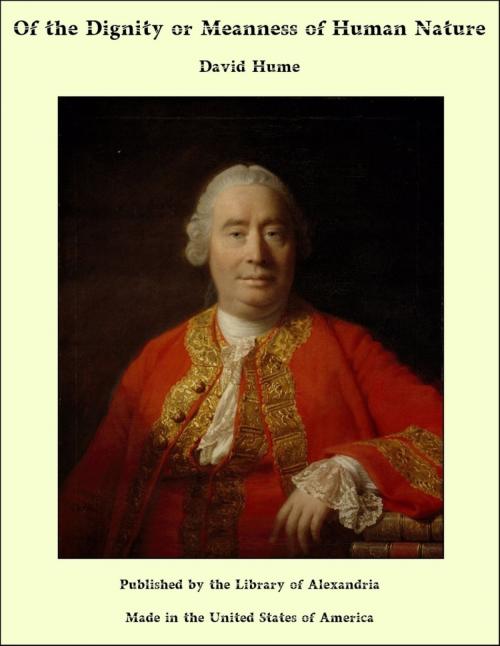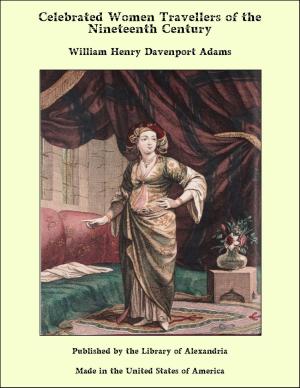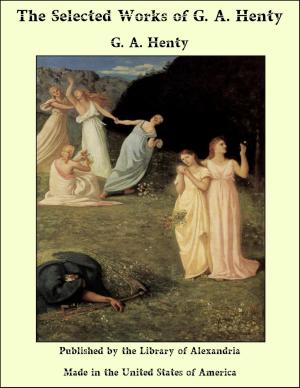Of the Dignity or Meanness of Human Nature
Nonfiction, Religion & Spirituality, New Age, History, Fiction & Literature| Author: | David Hume | ISBN: | 9781465501462 |
| Publisher: | Library of Alexandria | Publication: | March 8, 2015 |
| Imprint: | Language: | English |
| Author: | David Hume |
| ISBN: | 9781465501462 |
| Publisher: | Library of Alexandria |
| Publication: | March 8, 2015 |
| Imprint: | |
| Language: | English |
THERE are certain sects, which secretly form themselves in the learned world, as well as factions in the political; and though sometimes they come not to an open rupture, they give a different turn to the ways of thinking of those who have taken part on either side. The most remarkable of this kind are the sects, founded on the different sentiments with regard to the dignity of human nature; which is a point that seems to have divided philosophers and poets, as well as divines, from the beginning of the world to this day. Some exalt our species to the skies, and represent man as a kind of human demigod, who derives his origin from heaven, and retains evident marks of his lineage and descent. Others insist upon the blind sides of human nature, and can discover nothing, except vanity, in which man surpasses the other animals, whom he affects so much to despise. If an author possess the talent of rhetoric and declamation, he commonly takes part with the former: If his turn lie towards irony and ridicule, he naturally throws himself into the other extreme. I am far from thinking, that all those, who have depreciated our species, have been enemies to virtue, and have exposed the frailties of their fellow creatures with any bad intention. On the contrary, I am sensible that a delicate sense of morals, especially when attended with a splenetic temper, is apt to give a man a disgust of the world, and to make him consider the common course of human affairs with too much indignation. I must, however, be of opinion, that the sentiments of those, who are inclined to think favourably of mankind, are more advantageous to virtue, than the contrary principles, which give us a mean opinion of our nature. When a man is prepossessed with a high notion of his rank and character in the creation, he will naturally endeavour to act up to it, and will scorn to do a base or vicious action, which might sink him below that figure which he makes in his own imagination. Accordingly we find, that all our polite and fashionable moralists insist upon this topic, and endeavour to represent vice as unworthy of man, as well as odious in itself.
THERE are certain sects, which secretly form themselves in the learned world, as well as factions in the political; and though sometimes they come not to an open rupture, they give a different turn to the ways of thinking of those who have taken part on either side. The most remarkable of this kind are the sects, founded on the different sentiments with regard to the dignity of human nature; which is a point that seems to have divided philosophers and poets, as well as divines, from the beginning of the world to this day. Some exalt our species to the skies, and represent man as a kind of human demigod, who derives his origin from heaven, and retains evident marks of his lineage and descent. Others insist upon the blind sides of human nature, and can discover nothing, except vanity, in which man surpasses the other animals, whom he affects so much to despise. If an author possess the talent of rhetoric and declamation, he commonly takes part with the former: If his turn lie towards irony and ridicule, he naturally throws himself into the other extreme. I am far from thinking, that all those, who have depreciated our species, have been enemies to virtue, and have exposed the frailties of their fellow creatures with any bad intention. On the contrary, I am sensible that a delicate sense of morals, especially when attended with a splenetic temper, is apt to give a man a disgust of the world, and to make him consider the common course of human affairs with too much indignation. I must, however, be of opinion, that the sentiments of those, who are inclined to think favourably of mankind, are more advantageous to virtue, than the contrary principles, which give us a mean opinion of our nature. When a man is prepossessed with a high notion of his rank and character in the creation, he will naturally endeavour to act up to it, and will scorn to do a base or vicious action, which might sink him below that figure which he makes in his own imagination. Accordingly we find, that all our polite and fashionable moralists insist upon this topic, and endeavour to represent vice as unworthy of man, as well as odious in itself.















